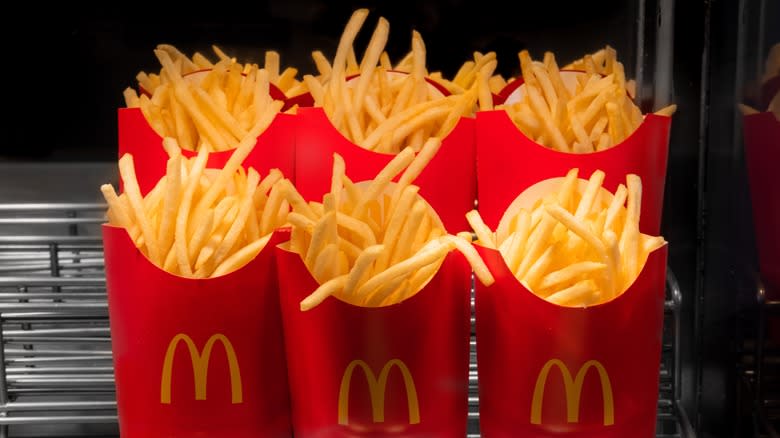McDonald's Owners See California Fast Food Bill As Financially 'Devastating'

- Oops!Something went wrong.Please try again later.
A momentous battle between labor unions and the fast food industry has come to a conclusion, and things are looking up for workers. Earlier this week, California Governor Gavin Newsom pledged to sign a bill into law in November 2024 that will create a $20 minimum wage for fast food workers, representative of a nearly $5 hourly increase. California's estimated 500,000 fast food workers currently make around $15.50, the state's minimum wage.
The new $20 minimum goes into effect on April 1, 2024, with the potential to increase each year through 2029 per a vote by the state council. The increase could be up to 3.5% depending on the future CPI rate and applies to all fast food chains with 60 or more locations nationwide. It's good news for workers, but perhaps unsurprisingly, not everybody's stoked about it.
The National Owners Association (an independent advocacy group of over 1,000 McDonald's store owners) says the new law will be a "devastating financial blow" to California franchisees, via CNBC. Per the NOA's statement, every McDonald's location in the state will have to pay an estimated $250,000 that they weren't expecting to spend this year. This cost could manifest in the form of menu price hikes, which isn't ideal for customers. Still, other industry figures espouse a more moderate reaction. International Franchise Association CEO Matt Haller says the bill "creates the best possible outcome for workers, local restaurant owners and brands, while protecting the franchise business model in California," per CNBC.
Read more: 25 Fast Food Fries, Ranked Worst To Best
Changing The Economic Playing Field Across The Board

This bill is the product of a lot of back and forth. When Governor Newsom signed the Fast Food and Accountability and Standards Recovery (FAST) Act in September 2022, creating a Fast Food Council to protect workers, fast food operators pushed back immediately. Union groups countered by pushing for legislation that would make fast food companies liable for any unlawful business practices by independent franchisees. A compromise was promptly reached thereafter. Now, it's unclear how this mandatory raise will play out on a larger economic scale. Increasing wages in one sector often leads to wage increases in other sectors, but also tends to cause the price of goods to increase across the board.
This $20 minimum wage is a promising start — and time will tell whether it inspires other states to adopt similar legislation. As Mary Kay Henry (president of the Service Employees International Union) put it, "[F]ast food cooks and cashiers have fundamentally changed the politics of wages in this country and have reshaped what working people believe is possible when they join together and take on corporate power and systemic racism," via CBS. Third-party food delivery drivers in NYC saw the minimum wage increase to $17.96 per hour on July 12, 2023, and it's scheduled to rise again to $19.96 by April 1, 2025.
Read the original article on Tasting Table.

